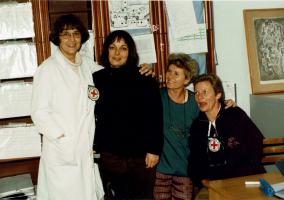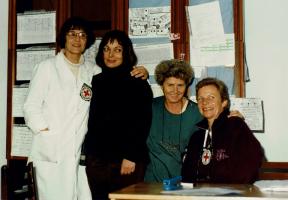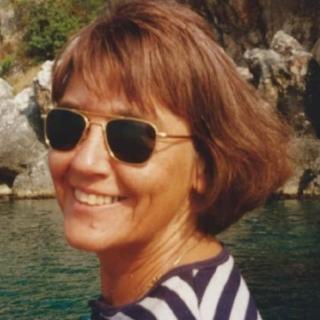Gunnhild Myklebust was born on 31 January 1946 in Volda, south-west Norway. She qualified as a registered nurse in 1968 after studying at Molde Nursing School. She then returned to Volda and began work as a nurse at the local hospital, first in the operating theatre and later in the surgery ward recovery department and outpatient clinic. She remained at Volda Hospital until August 1993. Gunnhild was a highly appreciated and much-loved colleague, known for being playful, impulsive and more likely to speak her mind than respect social conventions. In short, she was great fun to be around. She brought up five children, and her first grandchild was born in 1990. In addition to nursing, Gunnhild was fond of needlework, gardening and baking. She also volunteered in her spare time.
Her sunny disposition belied a serious commitment to help people in need, which grew as the years went by. In 1991 Gunnhild took time out to complete the Norwegian Red Cross post-graduate course in nursing related to disasters and war, which was held at the College of Nursing in Drammen. The following year, she spent six months as an operating theatre nurse at the Al-Ittihad Hospital in the occupied West Bank city of Nablus. The assignment was organized through the Norwegian Aid Committee and left a deep impression on Gunnhild. Helping people in conflict and disaster areas became increasingly important to her.
In August 1993 she moved south from Volda to Førde to work as an operating theatre nurse in the town’s Central Hospital. She joined the Førde Red Cross Society, eventually becoming a member of the board. She was later elected to the trust committee of the Norwegian Nurses Organisation, Førde branch.
In October 1995 she spent nine months in Bosnia-Herzegovina as an operating theatre nurse in the Norwegian Field Hospital in Tuzla. She was stationed with the Norwegian Medical Company, part of the United Nations peacekeeping force. Gunnhild was a popular and respected member of the team on account of her professional skills, care and kindness – and her ability to help others through difficult situations. With her cheerful nature, warm laugh and delicious home-baked cakes, she was the ideal colleague and companion.
Her first mission with the ICRC began in early November 1996 when she was seconded from the Norwegian Red Cross and posted to the Russian republic of Chechnya as a surgical ward nurse. She was based in the village of Novye Atagi, some 20 kilometres south-west of the capital Grozny, where the ICRC had opened a field hospital. Her second grandchild was born shortly after she arrived in Novye Atagi.
In the early hours of 17 December 1996, six delegates, including 50-year-old Gunnhild, were shot dead by masked gunmen in their rooms in the ICRC residence next to the field hospital. Like Gunnhild, four other murdered delegates had been seconded to the ICRC from National Red Cross Societies: Ingebjørg Foss, 42, also with the Norwegian Red Cross; Hans Elkerbout, 47, a construction manager with the Netherlands Red Cross; Nancy Malloy, 51, a medical administrator with the Canadian Red Cross; and Sheryl Thayer, 40, a nurse with the New Zealand Red Cross. The sixth delegate was head nurse Fernanda Calado, 49, from Spain, who had worked for many years with the ICRC. Another delegate, Christophe Hensch, a Swiss national in charge of the ICRC's Novye Atagi office, was shot and survived.
Jean de Courten, the ICRC’s director of operations, called the attack a cowardly, “deliberate assassination”. Following the tragedy, the ICRC evacuated its remaining 14 delegates from Novye Atagi. Local medical staff continued to care for patients at the hospital. Speaking at a memorial ceremony at Saint-Pierre Cathedral, Geneva, just days after the attack, ICRC President Cornelio Sommaruga said: “All six were dedicated to the ideal of solidarity with the victims of the Chechen conflict. They were fulfilling with exemplary enthusiasm the original mission of the Red Cross – to care for wounded – and they were doing it in the same spirit as the women of Solferino: ‘Tutti fratelli’ [We are all brothers].”
Gunnhild was a loving mother, grandmother and nurse who never stopped giving. She was unfailingly generous in spirit, sharing her time, her knowledge, her friendship and her innate human kindness with all who needed it. Her devotion to helping others was unconditional and knew no bounds.


